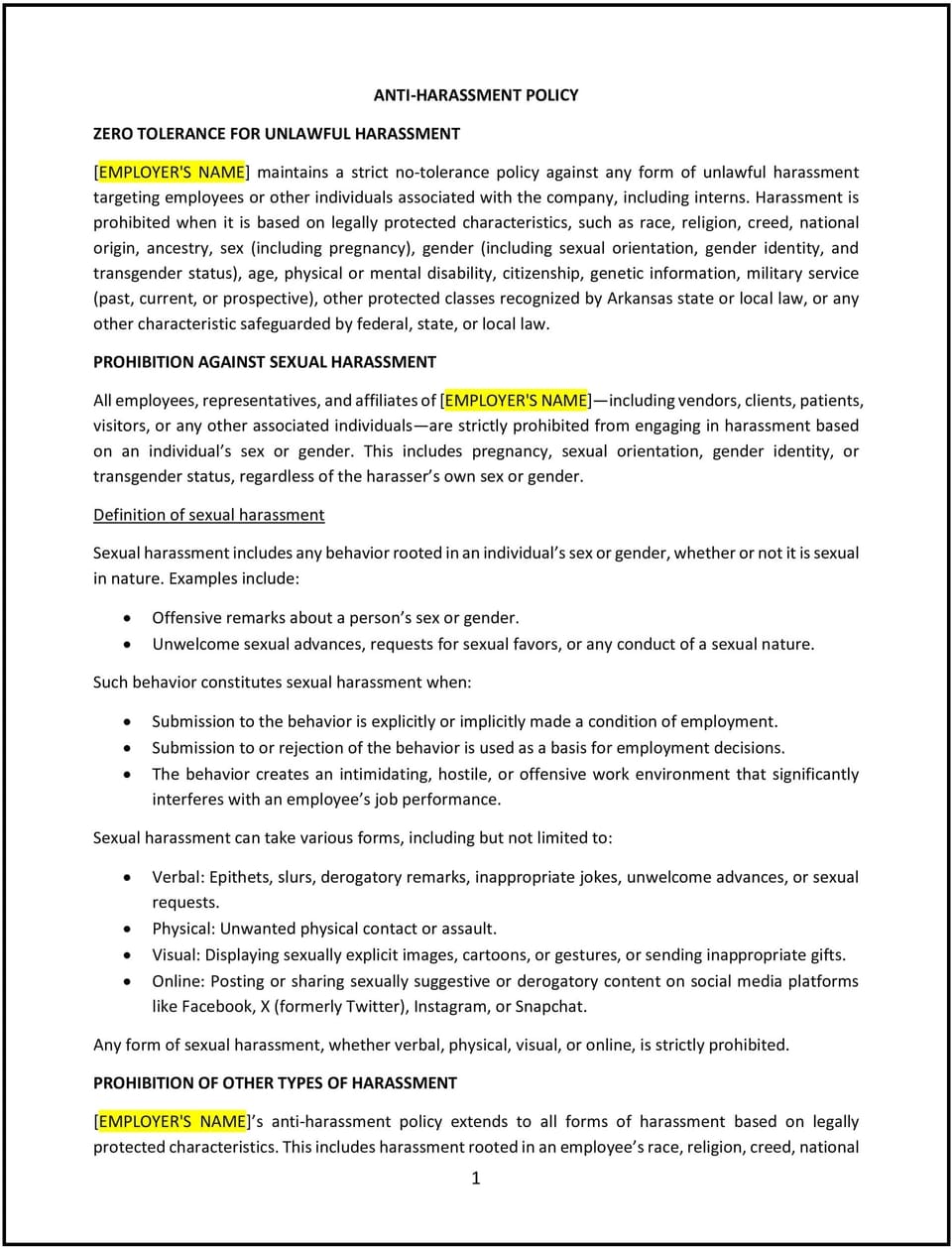Anti-harassment policy (Arkansas): Free template

Anti-harassment policy (Arkansas)
In Arkansas, an anti-harassment policy provides businesses with guidelines to prevent and address harassment in the workplace. This policy aims to create a respectful and inclusive work environment by prohibiting all forms of harassment, including sexual harassment, discrimination, and other unwelcome behaviors that violate employee rights.
This policy outlines prohibited behaviors, reporting procedures, and the steps the business will take to investigate and resolve complaints. By implementing this policy, Arkansas businesses can foster a positive workplace culture, reduce legal risks, and support compliance with state and federal anti-discrimination laws.
How to use this anti-harassment policy (Arkansas)
- Define prohibited behaviors: Clearly outline what constitutes harassment, including verbal, physical, visual, or online behaviors that create a hostile work environment or target employees based on protected characteristics.
- Establish reporting procedures: Provide a clear and confidential process for employees to report harassment, ensuring that all complaints are addressed promptly and without retaliation.
- Investigate complaints: Define the steps the business will take to investigate harassment complaints, including maintaining confidentiality, gathering evidence, and conducting interviews.
- Enforce consequences: Outline disciplinary actions for individuals found to have engaged in harassment, ranging from warnings to termination, depending on the severity of the offense.
- Provide training: Offer regular anti-harassment training to employees and supervisors to educate them on the policy, their responsibilities, and how to foster a respectful workplace.
Benefits of using this anti-harassment policy (Arkansas)
This policy offers several advantages for Arkansas businesses:
- Promotes a respectful workplace: Encourages a culture of inclusion and professionalism, reducing conflicts and improving morale among employees.
- Reduces legal risks: Ensures compliance with Arkansas state and federal anti-discrimination laws, minimizing the risk of lawsuits or regulatory penalties.
- Increases employee trust: Demonstrates the business’s commitment to employee well-being by providing clear protections against harassment.
- Enhances productivity: A harassment-free workplace allows employees to focus on their work without fear or distractions, improving overall performance.
- Ensures accountability: Sets clear expectations for behavior and holds employees accountable for upholding workplace standards.
Tips for using this anti-harassment policy (Arkansas)
- Address Arkansas-specific considerations: Ensure the policy complies with Arkansas’s anti-discrimination laws and incorporates any state-specific protections for employees.
- Communicate clearly: Ensure employees understand the policy, including examples of prohibited behaviors and the importance of reporting harassment promptly.
- Train supervisors: Provide managers with training on how to handle harassment complaints, maintain confidentiality, and prevent retaliation.
- Monitor effectiveness: Regularly review the policy and its implementation to ensure it effectively prevents and addresses workplace harassment.
- Foster open communication: Encourage employees to report concerns without fear of retaliation, emphasizing the business’s commitment to addressing harassment promptly and fairly.
Q: How does this policy benefit the business?
A: This policy helps the business create a safe and respectful workplace, reducing legal risks, fostering employee trust, and improving morale and productivity, all while ensuring compliance with Arkansas laws.
Q: How should the business handle harassment complaints?
A: The business should ensure all complaints are documented, investigated confidentially, and resolved promptly. This involves assigning trained personnel, maintaining neutrality, and taking corrective action as necessary.
Q: What steps can the business take to prevent harassment?
A: The business can provide regular training for employees and supervisors, communicate the policy effectively, and foster a culture where harassment is not tolerated and issues are reported promptly.
Q: How does the business address legal risks related to harassment?
A: The business ensures compliance with Arkansas anti-discrimination laws by implementing a clear policy, conducting regular training, and thoroughly documenting all reported incidents and resolutions.
Q: How can the business monitor the effectiveness of this policy?
A: The business can track reported incidents, conduct periodic employee surveys, review policy implementation regularly, and update training programs to reflect any changes in laws or workplace dynamics.
This article contains general legal information and does not contain legal advice. Cobrief is not a law firm or a substitute for an attorney or law firm. The law is complex and changes often. For legal advice, please ask a lawyer.


